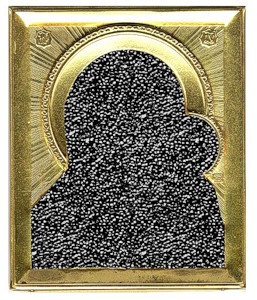The prosecution claimed that Yuri Samodurov, then Director of the Sakharov Museum and Andrei Yerofeev, then Head of the Department for Contemporary Art at the State Tretiakov Gallery, had arranged the exhibition in such a way that it denigrates Christianity, and especially the Russian Orthodox faith, and incites hatred against Orthodox and other Christians.
Hatred against Orthodox
The exhibition Forbidden Art 2006 displayed a number of works of art, including by some of Russia’s most renowned contemporary artists, such as Ilya Kabakov, Alexander Kosolapov, the group “Blue  Noses”, Aleksandr Savko and Mikhail Roginskii.
Noses”, Aleksandr Savko and Mikhail Roginskii.
All of them had been turned down at various exhibitions during 2006, though some of these works had previously been displayed at other exhibitions of contemporary art in the Russian Federation and around the world.
Among the works of art presented at the exhibition was, for example, a photomontage of a photograph of an icon frame with a photo of caviar inside the icon.
Other examples included reproductions of religious paintings with an inserted figure of Mickey Mouse. There were also works which contained erotic elements, or used non-normative language.
Institutional censorship in culture
The exhibits were concealed behind a false wall and could only be seen through small holes. The organizers decided against putting images of the exhibits on the museum’s website, and no photography was allowed. Attendance was also expressly not recommended for persons younger than 16.
According to the organizers, it was planned to stage a series of Forbidden Art exhibitions over several years with the aim of monitoring and discussing the trends of institutional censorship in culture.
The charges against Yurii Samodurov and Andrei Yerofeev were brought in May 2008 on the gro unds incompatible with the right to freedom of expression enshrined in international law as well as Russian legislation.
unds incompatible with the right to freedom of expression enshrined in international law as well as Russian legislation.
Amnesty International believes that the exhibition Forbidden Art 2006 does not incite hatred and that the organizers of the exhibition should not have been prosecuted.
Start of trial in 2009
The trial of the two men started in Taganskii District Court in Moscow in June 2009. Trial observers stressed that during the trial, only one witness for the prosecution stated that he had, in his own words, “glanced” at the exhibition. The others told the court that none of them had visited it. Nevertheless, they claimed that the exhibition incited hatred.
An expert opinion commissioned by the prosecution found that the exhibition and the works of art are “not anywhere close to art … as art is by definition about the cultivation of spiritual values and the concept of beauty, not about its destruction”.
The expert compared the artists whose work had been shown at the exhibition to drug addicts, stating that “art dealers or the organizers of the exhibition were, like drug dealers, making a living out of people’s tragedy”.
No place for contemporary art
“For me, the trial in the case of the “Forbidden Art – 2006” exhibition is not just a criminal trial. It is also an ideological and political tribune for the defence of what is important for me as the former director of the Sakharov Centre, as a citizen and as an individual, and in order to  attract public attention to these issues”, – wrote Yurii Samodurov in his blog on Grani.ru on 1 March 2010 (read English translation here).
attract public attention to these issues”, – wrote Yurii Samodurov in his blog on Grani.ru on 1 March 2010 (read English translation here).
In his text he said that at the trial he is defending himself, the Sakharov Centre and the exhibition’s curator, Andrei Erofeev.
According to Dmitry Gutov, the first witness for the defence, who participated in the trial on 1 March 2010, it is unsafe for cultural institutions to show works of contemporary artists, which art experts and curators find interesting, but a great number of potential viewers (many of whom are believers) could consider blasphemous, anti-State, immoral and unartistic works. He says that today in the Russian Federation, there are no such places where the artist could safely exhibit such works.
The last hearing was held on 21 June 2010, and the judge’s decision is expected to be disclosed on 12 July.
Take action
Visit Amnesty‘s International website to find out more details how to send an appeal to the President of Russian Federation Mr. Dmitry Medvedev, urging that the Russian authorities stop the criminal prosecution of Andrei Yerofeev and Yuri Samodurov and to close the case against them.
HRH Oslo, based on Amnesty International and Yurii Samodurov information.
Related links:
ARTICLE 19 Artist Alert – May 2010


